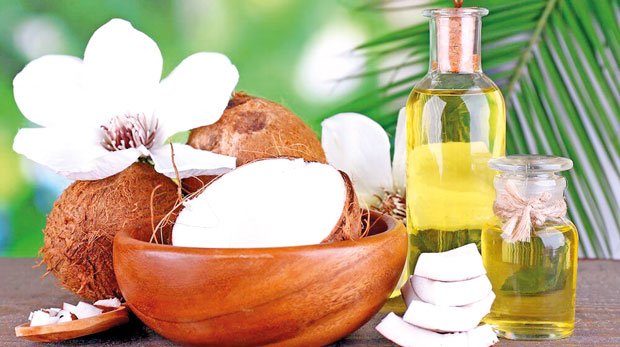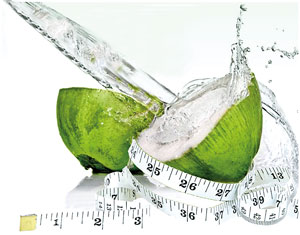16 Mar 2018 - {{hitsCtrl.values.hits}}

 Coconut is one of the major plantation crops in our country. It is the favourite choice of Sri Lankans when they have to use oil for cooking. In addition the oil is a popular constituent in beauty products due to the various health and nutritional benefits it possesses. However, people have certain doubts regarding the nutritional aspects of coconut oil since it is rich in saturated fatty acids when compared with other vegetable oils.
Coconut is one of the major plantation crops in our country. It is the favourite choice of Sri Lankans when they have to use oil for cooking. In addition the oil is a popular constituent in beauty products due to the various health and nutritional benefits it possesses. However, people have certain doubts regarding the nutritional aspects of coconut oil since it is rich in saturated fatty acids when compared with other vegetable oils.
The process
Coconut oil is derived from the kernel of the coconut (Cocos nucifera). Coconut oil extraction is done in two ways; the dry process and the wet process. In the dry process, copra is used to extract the coconut oil whereas in the wet process, coconut oil is extracted from coconut milk.
Types of oil
In our local market, coconut oil is available in different grades based on the coconut oil extraction method that’s used.
1. White coconut oil- This oil is extracted from good quality copra and retains natural coconut taste, flavour and nutritional value. This product is ideal for frying.
2. Refined bleached and deodorized (RBD) coconut oil- This oil is extracted from copra where the process involves a dried form of coconut kernel. This product is ideal for cooking. Some refined oils are hydrogenated and may contain trans-fat.
3. Virgin coconut oil- This oil is extracted from fresh coconut flesh at low temperature. The oil has not been exposed to any chemicals or bleach that are required in the refining process. In both dry and wet extraction of virgin coconut oil, the brown thin skin of coconut kernel is avoided. As a result, the extracted virgin coconut oil is colorless. It has higher antioxidant content, vitamin C and stronger coconut taste.
4. Pairing oil- This oil is extracted from fresh pairings resulted from the desiccated coconut, coconut cream from the coconut milk industry. It has a very high flavour and is ideal for frying and cooking.
5. Industrial coconut oil-This oil is extracted from low grade copra and is suitable for industrial purposes.

Health benefits
1. Thermal stability
Coconut oil’s composition is unique and 90 % of its fatty acids are saturated. Coconut oil is heat stable because it contains saturated fatty acids which have high thermal stability compared to polyunsaturated fatty acids. Therefore, coconut oil is considered as the most suitable oil for frying purposes.
2. Reduces the risk of fat deposition
Coconut oil contains over 90 % of short or medium chain fatty acids while it naturally contains a mixture of medium chain fatty acids and long chain fatty acids in a ratio of 3:1. However, these short and medium chain fatty acids are rapidly absorbed in the intestines while long chain fatty acids required pancreatic lipase enzyme for absorption. They eventually reach the liver where they either undergo beta oxidation, production to cholesterol, or are repackaged as triglycerides. But short and medium chain fatty acids are rapidly oxidized to energy. Unlike long chain fatty acids, medium and short chain fatty acids do not enter the cholesterol cycle and they aren’t deposited in fat depots.
3. Antimicrobial activity
Nearly half of the coconut oil’s fatty acids are lauric acid, a source of monolaurine which has antiviral, antibacterial (particularly against to Vibrio cholerae, Salmonella typhi, Shigella sonnei and Escherichia coli) and antiprotozoal properties. Monolaurine can destroy lipid-coated viruses including influenza viruses. Coconut oil can also boost a weakened immune system by enhancing white blood cell counts which help the body to directly fight against viruses.
4. Antioxidant activity
The antioxidant capacity of coconut oil is due to the presence of phenolic substances and it depends on the coconut extraction method. According to some research studies, virgin coconut oil, which is produced through chilling and fermentation, have a better antioxidant capacity compared to refined bleached and deodorized (RBD) coconut oil. This is because natural phenolic antioxidants are removed during the refining and bleaching steps. Moreover, few studies have proved that the presence of antioxidants in coconut oil is stable at high cooking temperatures and their activities remain even at 120 0C.
5. Anticancer activity
Studies have shown that there is an ability in coconut oil to inhibit cancer agents in the colon and in mammary tumors (in breast) due to the presence of saturated fatty acids mainly lauric acid which is more protective than unsaturated oil.
6. Improves memory and brain function
Our brain cells depend on mitochondria which generates energy through glucose metabolism. This energy is required for brain functions. Alzheimer’s disease is a progressive disease that destroys memory and other significant mental functions, during which mitochondria becomes less able to absorb and use glucose and eventually it affects the glucose metabolism. A number of research studies have discovered that the intake of coconut oil improves mental skills. Medium chain triglycerides directly enter the liver and produce the ketones by breaking down of medium chain triglycerides. Then these ketones are transported to the brain through the blood stream. When glucose metabolism fails, these ketones can act as an alternate fuel. Moreover, there is a belief that ketones may help restore and renew neurons in the brain.
7. Improves serum cholesterol
A number of studies conducted by using animals have reported that the consumption of coconut oil may increase serum HDL cholesterol (good cholesterol) level and reduce the total cholesterol, triglyceride and LDL (bad) cholesterol levels due to action of polyphenols and vitamin E in coconut oil. Besides, saturated fat also plays a role in the improvement of HDL cholesterol.
8. Preserve insulin action
Insulin resistance is an impaired ability of insulin to regulate carbohydrate and lipid metabolism in target tissues while it is closely linked with excess lipid deposition in non-adipose tissues such as skeletal muscle and liver. This insulin resistance is one of the major metabolic defects of obesity and type 2 diabetes. According to some experiments on animals, medium chain fatty acids preserve insulin action in muscle and adipose.
9. Boosting thyroid function
Unsaturated fatty acids change the hormones while it can damage thyroid hormones which cause to block thyroid hormone secretion. Therefore, refined unsaturated vegetable oils suppress the thyroid function and can cause weight gain. But coconut oil is not rich in unsaturated fatty acids. Therefore, coconut oil doesn’t make negative effects on thyroid function while it helps the thyroid gland to function normally.
10. Improve the health of skin and hair
Virgin coconut oil is very popular as a therapeutic moisturizer for mild to moderate dry skin in soap industry and other beauty care products. And also, coconut oil has skin antiseptic effects. Therefore, coconut oil has formulated into cream to retain antimicrobial activity of coconut oil. In addition, virgin coconut oil extracted by cold wet methods contains higher amounts of vitamin E and A. Therefore, coconut oil has been used as a popular ingredient in many skin care and hair care products due to its moisturizing effect, vitamin E and A content, and antimicrobial activity.
Coronary heart disease and coconut oil
During past few years, people believed that coconut oil has a significant influence on coronary heart disease since it is rich in saturated fatty acids. It is a common opinion that saturated fat is bad for health and it increases cholesterol levels in blood. However, when considering health effects of saturated fat, it is also important to consider the chain lengths of fatty acids since its metabolic pathways depend on the chain length. Results of some research publications indicate that shorter chain fatty acids oxidizes more easily instead of entering the fat deposits compared to longer chain fatty acids. In addition, coconut oil contains a lipid fraction and non- lipid fraction. Of these two fractions, lipid fraction is a highly important fraction in occurrence of heart diseases.
Elevated levels of circulating low-density lipoprotein (LDL), which are rich in cholesterol and cholesterol esters, are risk factors for developing coronary heart disease. Because, gradual deposition of cholesterol inside the arteries cause to reduces the blood flow to the heart muscle and result in a heart attack. However, a few of animal based experimental studies showed that coconut oil doesn’t contribute to coronary heart disease due to coconut oil’s increased level of HDL cholesterol (good cholesterol) and decreased level of LDL cholesterol (bad cholesterol), triglycerides and total cholesterol.
Moreover, oxidized low density lipoproteins play critical role in the deposition of cholesterol-laden cells into the arterial wall while adequate evidence suggests that inhibition of the oxidation of LDL may reduce the risk of heart disease. Consumption of coconut oil may help to inhibit the LDL oxidation because coconut oil is rich in several phenolic substances which show antioxidant properties. As a result of that there are growing evidence from epidemiological and controlled studies that correlates a high intake of antioxidants with a lower incidence of CHD.
In conclusion, coconut oil has lots of health benefits while those aspects are based on the fatty acid composition of coconut oil. However, the fatty acid composition of coconut oil does not significantly vary with extraction method. Among different types of coconut oils in our local market, virgin coconut oil provides better beneficial effect on our health compared to other types of coconut oil. Moreover, according to the fatty acid composition of coconut oil, it has only a minimum trend to produce the trans fats which has adverse effect on development of cardiovascular diseases. The reason is that, coconut oil is not rich in polyunsaturated fatty acids compared with other vegetable oils. However, coconut oil contains only 1-2 % of essential fatty acid. Therefore coconut oil is not a good source of essential fatty acids.
(The writer holds a MSc. Degree in Industrial and Environmental Chemistry from the University of Kelaniya and BSc. Degree in Food Production and Technology Management from the Wayamba University of Sri Lanka).
22 Dec 2024 9 hours ago
22 Dec 2024 9 hours ago
22 Dec 2024 22 Dec 2024
22 Dec 2024 22 Dec 2024
22 Dec 2024 22 Dec 2024